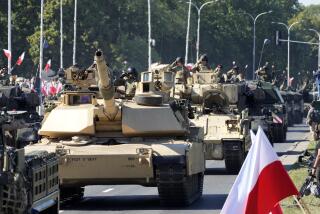Europe Is Doing Its Fair Share
- Share via
BONN — The integration of Poland and other countries in Eastern Europe into the Western community of nations will contribute just as much to democracy, prosperity and stability in Europe as the integration of Germany has done. Enlarging NATO is broadly supported in Germany, both by parliament and by the public. This is not only because it was the Polish, Czech and Hungarian commitment to freedom and liberation that finally brought down the Berlin Wall and the Iron Curtain, but also because fostering European integration and transferring stability to the East of Europe are in the interest of all the parties concerned.
There will be costs and commitments in connection with the enlargement of NATO, but they will be shared fairly among all NATO member states. There will be no free ride. Old and new members will pay for the modernization of their forces as an effective contribution to collective defense and the other NATO missions. The European allies will continue to spend the biggest portion of the NATO budgets, which will cover the collective, incremental costs of enlargement.
Integrating new members is, however, first and foremost a political and strategic decision. The costs and benefits of the enlargement cannot be expressed in financial terms only. For each of the new members, it is less costly to find security and stability within the alliance rather than on a purely national basis. In addition, it must be taken into account that the evolving cooperative security structure in Europe, which includes Russia as an equal partner, will have a positive impact on the alliance’s defense requirements.
In terms of modernization, it is important to concentrate now-scarce resources on improved communications, NATO’s integrated air defense system and improvements in airfields and port facilities for the reception of NATO forces. Even more important than equipment programs, however, is human investment. The new members need personnel familiar with the spirit and mechanisms of the alliance.
More than 1,000 Polish officers have been trained in Western countries, most of them in the United States and Germany. Germany, Denmark and Poland have decided to establish a trinational army corps; the commander of the Polish division is a graduate of the German Command and Staff College. All this means not only peacetime integration from the outset, but also a common commitment to the security and defense needs of a new alliance member.
Germany is restructuring, modernizing and reequipping its armed forces so that all future challenges for an enlarged alliance can be mastered. This includes the capability to mobilize, in times of severe crisis, up to 650,000 combat-ready soldiers within just weeks. We still put the burden of compulsory national service on our young generation, drafted and drawn upon not only for the national defense of Germany, but also for the collective defense of the alliance, including the new members.
Since 1992, the Europeans have provided over five times more aid and assistance to Central and Eastern Europe, Russia, Ukraine and the countries of the former Yugoslavia than has the U.S. This does not include 400,000 or so refugees from Bosnia and Herzegovina in Germany. Our American friends can rest assured that their European allies are assuming and will continue to assume their fair share of the common bill and burden.
By enlarging NATO, we are not excluding or isolating Russia. Quite the reverse. We have proved our willingness to engage with Russia in a real security partnership. This will have an enormous stabilizing effect on Europe as a whole and lead to an enhancement of stability and security for all of Russia’s neighbors. We have always made it clear that for NATO, two principles remain essential: cooperation and reassurance. The better cooperation works, the less we are dependent on our defense capabilities for reassurance.
We will master the current historic opportunity only if Europe and America take on the challenge shoulder to shoulder. Nowhere do our common political, strategic and economic interests converge more clearly than in our common goal to achieve security and stability in and for Europe--a goal that farsighted political leaders like Harry S. Truman, George Marshall and Konrad Adenauer formulated 50 years ago.
More to Read
Sign up for Essential California
The most important California stories and recommendations in your inbox every morning.
You may occasionally receive promotional content from the Los Angeles Times.










